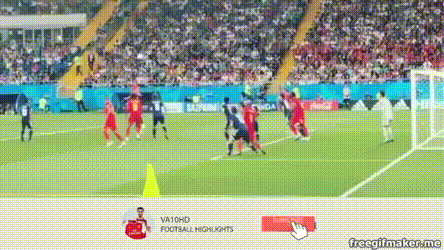
ROMELU LUKAKU
In this year’s World Cup Round of 16, Belgium were down 2-0 by the 53rd minute. They weren't playing poorly. The Japanese were just playing better. Their winger Takashi Inui scored the second goal with a scorcher from distance: the ball looked like it was on a string in a 50’s Hollywood B-movie. On the Belgian side, striker Romelu Lukaku could not score. He took six shots. He scuffed balls, got them stuck between his legs, and blasted them over. Twice, defenders swept across his shot, legs outstretched, and blocked him. The goalkeeper saved a header in the 85th minute.

Lukaku needed to rid himself of the godforsaken curse that was keeping his shots out. Scoring droughts might be frustrating, but they provide an opportunity to give to others. Belgium couldn't afford to take Lukaku out, so how could he help without letting his cursed day screw things up? Soccer is a deep sport. You can dictate the game without even touching the ball.
For Belgium’s first goal, Lukaku worked in a scrum deep in the Japanese box. He didn’t give up on a looping ball that the goalkeeper could have easily claimed; nothing is conceded; every ball is contested. The Japanese goalkeeper could only get off a feeble punch, and the ball eventually came to Jan Vertonghen’s head.

Nothing pretty from Lukaku. Just effort.
In the 74th minute, Belgium drew even. Marouane Fellaini did what Lukaku couldn’t: he blasted a header by the Japanese goalkeeper. Out-leaping two defenders, Fellaini looked like he was playing against Japan’s U18s. Lukaku was right behind him, supporting, open, ready to knock the ball in with an easy poke, if necessary. It wasn’t.
Between Belgium’s second goal and the game’s end, Japan needled away at the Belgian defense, cutting slivers, sending attackers through to Courtois’ goal. The rangy Belgian goalkeeper denied all comers. The last was a Japanese corner in the 94th minute, a harmless floater into the box. Courtois caught it and turned it to burning coal. He shoveled it into the team’s furnace, Kevin De Bruyne, and De Bruyne took off, right down the middle of the field, doing exactly what Kevin De Bruyne is meant to do: transfer the ball from defense to attack.
Lukaku was ahead on the right side, and he thought: I know it isn’t going to be me scoring, but it’s got to be we scoring. He played as if the team’s success was more important than his own. As if he were the conduit to success, not the terminal, and in the next ten seconds, the last of the game, Lukaku completed two good deeds to make Belgium’s winning goal and snap his curse.
His first was creating space for a teammate. In this one, the ball never came near Lukaku. Once De Bruyne was past the Japanese midfield, Lukaku sprang to life. He started a run, angling to the middle of the field, behind the last center back. He pointed and yelled for the ball to make the defenders believe. His man followed him, opening a huge gap on Japan’s left side for Thomas Meunier to run into. De Bruyne’s pass into space would have taken a million engineers to measure so perfectly.

For Lukaku’s second good deed, the ball came to him, but still he didn’t touch it. Instead, he dummied. The typical dummy starts with one attacker pretending to receive the ball, but then letting it go between the legs, past the beguiled defender, and straight to an open teammate.

Showmen like Thierry Henry might throw in a fake swinging leg. Pelé’s famous dummy in the 1970 World Cup was to himself, and he ran past the ball, didn’t put it through his legs. Though that’s an often celebrated clip (he didn’t score), it’s not even the best Brazilian dummy. That award takes us to 1982, to a World Cup group game in Seville, Spain, to a star-studded Brazilian team, and their playmaker Falcão.
Brazil was playing the USSR in the last group game, and their winning goal came by way of a nonchalant yet demonstrative dummy.
Tied with two minutes left, Brazil passed the ball around the top of the Soviet box. When the pass came to Falcão, he went pure ghost. No-look, he opened his legs and just kept walking. The ball went to a charging Eder who popped it into the air then fired himself into World Cup history. The goalkeeper didn’t move.

Back to Belgium’s goal. Thomas Meunier took only one touch to serve the ball across the goal. Lukaku was at the penalty spot with a defender all over his inside shoulder. He checked behind him, saw a teammate, Nacer Chadli, following. Everything in him wanted to hit the ball, but he had to sacrifice. He had to be the lamb, or the scoring drought would never let up. He had to trust his teammate, trust that Chadli would come through in the last minute of the most important game that either man had played.

Lukaku’s dummy didn’t have that seleção cool. It didn’t have Pelé’s ingenuity or Henry’s flare.
It was a sacrifice, and a sacrifice rarely looks pretty.

